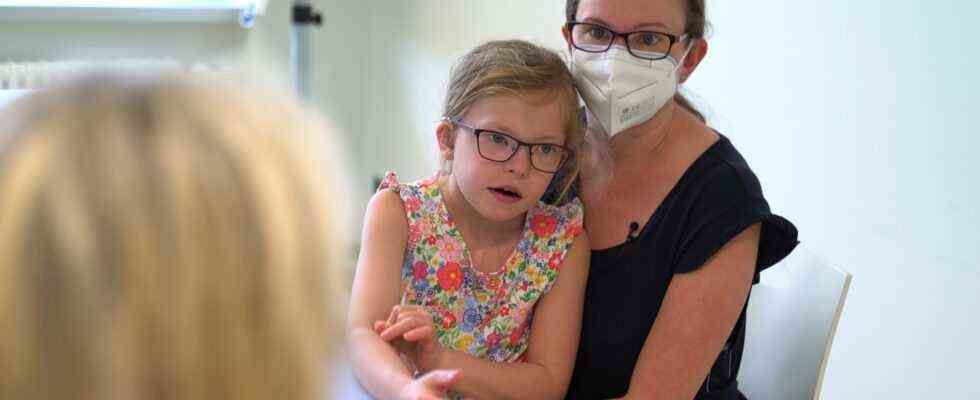#in the middle
Status: 07/09/2021 2:56 p.m.
The Delta variant is fueling the debate about vaccinations for children. The team at a children’s clinic in Augsburg is working to help those little ones who are physically or mentally ill due to Corona.
Magdalena hugs Barbara Lang, her mother. The eight-year-old is a stranger to the treatment room with the treadmill and the glass cabin in which both wait for their doctor. She is about to do an important test here. “Headache, the unbearable, repeated diarrhea, poor lung function, Magdalena has had that since she had Corona in December,” says Lang.
# in the middle: Long-Covid in children and the severe treatment of this disease
Andreas Herz, BR, topics of the day 9.45 p.m., July 9, 2021
Magdalena suffers from Long Covid. She is particularly susceptible to the virus because of several previous illnesses.
Long Covid often undetected in children?
This is both a curse and a blessing. Because the regular examinations would have helped to detect Long Covid in the girl at all, says doctor Britta Welzenbach when she comes into the treatment room: “The problem, especially with small children, can of course be that they don’t notice it, that they don’t say: ‘Mom, I have a headache, I never had that before.’ Or: ‘Mom, I have a stomachache now.’ ”
Perhaps that is why more children suffer from Long Covid than expected. So far, however, experts have only assumed that there are very few people affected. But they also have to be helped. Magdalena was prescribed a new drug to improve lung function. Now everyone is hoping that it will work.
The drug works: Magdalena during an examination at the Josefinum children’s hospital in Augsburg.
Image: Andreas Herz / BR
“A bit of trial and error”
To find out, Magdalena has to get on the treadmill. The speed is slowly increased. With her mouth wide open, the girl tries to keep up. Mama is behind it. Does the drug help? What if not? Thoughts that are meanwhile normal for Barbara Lang.
After the run, Magdalena has to go to the room. Again and again she blows with full force into a tube. This tests how the lungs react to the stress. Meanwhile, doctor Welzenbach is concentrating on a computer that is translating Magdalena’s puffs into numbers. Welzenbach begins to smile: “The specific breathing resistance is now normal. This is a value that measures how narrow or wide the airways – in other words: the bronchi – are.”
So the drug works. A success for the medical team at the Josefinum, which has to break new ground in the treatment of Long Covid. There is no standard therapy. “It’s a bit like the ‘trial and error’ method,” says Welzenbach.
The psyche of many children also suffers
But Corona does not only leave physical consequences. Michele Noterdaeme, a woman with short gray hair and casual clothing, leads to station C3. Most visitors are not allowed to go any further here, because something like the intensive care unit of child and adolescent psychiatry begins behind the ward door, headed by the professor.
She is concerned about the effects of the pandemic: “After you lose control over almost everything, there are young people who compensate for this with a pronounced need to control.” This leads to the most severe obsessive-compulsive disorder, which in turn can sometimes lead to some people not wanting to eat anything.
For example, many girls only stay healthy because they have a certain structure through the school and their peer group. “And when that goes away, all I have left is food that I can control.” Massive eating disorders, depression, urgent suicidal thoughts – these are also consequences of the corona pandemic. “We have to take in a disproportionately large number of young people,” says Noterdaeme. “Yes, we are at the limit!”
Magdalena is also to be examined psychologically. The clinic’s medical director has come to discuss her treatment.
“Important to work out concepts before autumn and winter”
The whole medical team is concerned with the question of how children can be protected in the pandemic – and from the now increasing delta variant. “It is important to work out good concepts before autumn and winter so that public life – i.e. schools and daycare centers – simply keeps going,” says Welzenbach.
And the vaccination plays a very important role: “We would like good data promptly so that we can administer the whole thing to the children with the best of our knowledge and belief. Both the risk groups and then perhaps the non-risk groups.”
Vaccinations are not an option for children
Barbara Lang would have Magdalena vaccinated – if the vaccine was approved for her age group. A post-vaccination of Long Covid has cured some adults. This option does not yet exist for Magdalena. She has to overcome the disease differently.
After the treatment, the eight-year-old wants to be in her mom’s arms. Because of Long Covid, she no longer has the strength to walk back to the car on her own.

